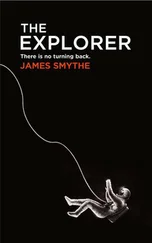‘Sit down,’ he says, and he reaches over and clips her in himself. ‘Be more careful, okay?’ She nods and he kisses her forehead. He looks behind and out of the window, to see if anybody’s following them. He doesn’t know why, but it doesn’t hurt to be paranoid, he tells himself. This is what they want: the press, his enemies. They want him when he’s dropped his guard.
Deanna’s finished her new book. She’s opened the file every day for the last week and read it all morning, right the way through until she picks up Alyx from school. It takes that full stretch of time: not because it’s especially long, but because she focuses on it, gets as deep as she can. She’s been editing it for weeks now, going over and over the words, searching for the truth in what she’s written. It’s important to find it because that informs the story, the characters. Every word is careful; every word has meaning. It’s arduous; but, she reminds herself, it probably should be.
It’s eleven when she finally hears Lane waking up. Doors slam – bedroom, bathroom, bedroom again – and then comes the sound of her boots on the stairs. Deanna shuts her laptop, so that her daughter doesn’t see what she’s been working on – as if she would care, Deanna thinks – but then Lane is gone without even coming into the kitchen. Another slam, this time from the front door. There’s no shout of goodbye.
Deanna thinks about going after her, but it would be pointless. She would yell at her and Lane would ignore her; or she would chase her and Lane would bite her hand off. They’re losing her, Deanna thinks. She’s old enough to leave home but she has no job or indication of a desire to do anything with her life, and that’s all that keeps Deanna hopeful: that Lane’s own lack of ambition, of drive, will keep her here for a while. While she’s at home, they can keep an eye on her; and it means that the house doesn’t become even emptier. Because Lane makes noise. Alyx is quiet, appearing in doorways and padding around in her bare feet, but Lane is noisy, and she’s difficult, and she fills the house with her presence.
Deanna returns to the manuscript and her emails. As well as the new book she has got an email in draft. It’s been half written for the last few weeks, addressed to her agent. He stopped calling after Sean died, most likely because it suddenly became something that he would have to talk about but clearly wanted to avoid; and, Deanna reckons, he wrote her off. There was no chance of her finishing a book while she was still in mourning. And she felt the same, until she realized that the feeling of mourning was never going to go away. Then it became freeing, and that’s when the words came. And it might be that he’s not the best person to represent her now. Her previous books were flowing and grounded and real, but this new one is so sparse and fantastical he might be the wrong person to try and sell it for her. The email says all of this, but then it introduces the book to him anyway. Into the Silent Water , she’s called it.
She describes the setting, the characters: a woman has forgotten who she is, but she wakes in a land that’s flooded, a thick and grotesque scar marked across her forehead. Her mark means that she did not die accidentally: it means that she killed herself. In her hand there is a picture of a child, and all that she knows is that she is there to find him. But he is lost, and she wonders, as she goes, how intentional this all was; that maybe her own death was the first part of a quest that she cannot possibly hope to complete.
As she reads the synopsis, the novel, she thinks how thinly veiled it is, but that it doesn’t matter to her. Not with this book. She wants to publish it under a pseudonym, if it’s good enough to even be published in the first place. She can’t tell; she’s never been able to tell. She’s sure that nobody will want to hide who she is, especially if Laurence gets further in the race. After that, everybody will want their blood; she just hopes that it’s harder to take it if you don’t know it’s there, waiting to be tapped.
As they wait at the airport’s check-in desk, Amit talks to Laurence about how this will be once he’s secured the nomination.
‘Then,’ he says, ‘they’ll wheel out the plane to ferry you around. No waiting. Think about that. And then, you know, a couple of years down the road, Air Force One.’
‘You’re cursing it,’ Laurence says.
‘It’s not a curse,’ Amit says. ‘You’ve seen the polls. Can’t curse that.’
‘I’ve seen three percentage points.’
‘Exactly. Foundations.’ In front of them an elderly couple bicker about the flight. They throw statistics at each other like curveballs. The airline hasn’t had an accident in a while, the woman says; that means, statistically, they are now more likely to. She talks about safety protocols and how likely they are to have slipped, reading probability numbers from the ClearVista app on her phone. The man counters that, behind the scenes, the airline is likely to have picked their game up specifically because of the existence of ClearVista . They’ll want to reassure their customers that they can be trusted. The woman asks why the likelihood of an accident – a percentage that’s higher than the airline’s nearest rivals – isn’t higher, then. The man says that they haven’t taken that into account yet. It hasn’t propagated. Laurence listens while trying not to, and watches Amit tweeting about their day, about where they’ll be and what they’ll be doing.
The delegates picked him, not caring about his lack of experience. Statistics and predictions, that was the way that the business of politics was always going to be heading and Amit came from that background, having worked for ClearVista in their early days. He helped to write their algorithm, the algorithm that has now intruded on so much of the world in one way or another. Too much math, he said, when Laurence asked why he wanted out of such a big company. They were something close to friends now, sure, but business always comes first. Laurence can’t imagine this relationship going further if he loses the race. Laurence knows how this works for Amit if they fail. He will bounce back, and he’ll be here again in four years with another potential candidate. His numbers, based on his time with Laurence, will be better; his stock maybe even higher. Especially if he jumps ship before he’s pushed. If he sees the way it’s going, watches the tide.
The couple checks in, finally, and moves on, and then Laurence and Amit are second in the queue. The man in front of them holds his ticket up to the scanner and hands his ID to the girl behind the desk. He has no luggage, not even a carry-on, just a blue jacket, carried in his hand. It’s expensive-looking but bundled up. He pockets his ID, and he looks at Laurence as he steps past them. He nods, and smiles. Amit notices.
‘He knew who you were, see?’
‘What?’ Laurence is caught for a second, somewhere else.
‘He recognized you. Foundations, then a ground swell of being recognized. That’s as good as support, because he’ll remember that. He sees your face on a ballot, he’ll remember who he wants to vote for. You’ll see.’ Amit hands the assistant their IDs, and both men hold their phones out to scan their tickets. She asks them the usual questions and Amit answers for them. Laurence glances behind them.
‘I don’t like being recognized,’ he says. ‘They raided the trash this morning.’
‘Who did?’
‘Somebody in the night,’ Laurence says. ‘Didn’t see who they were.’
‘That’s what some people will do. They’re desperate for news.’
‘News isn’t in my fucking garbage cans, Amit.’
‘Yeah it is. Larry, news is and always will be whatever somebody can get their hands on that somebody else will pay to read.’ He hands Laurence back his ID card. ‘Flight’s twenty minutes late. Let’s get a coffee.’
Читать дальше












